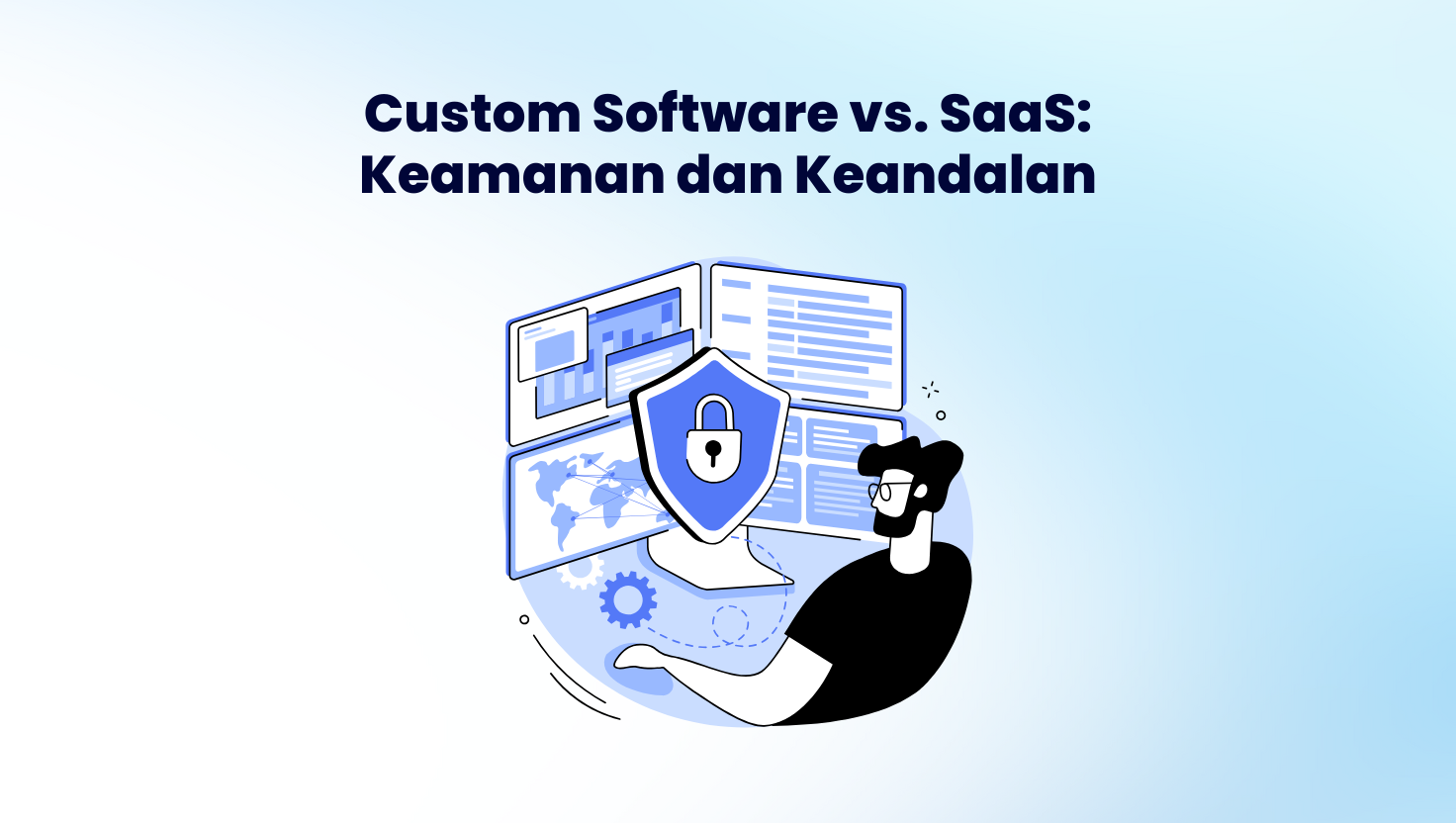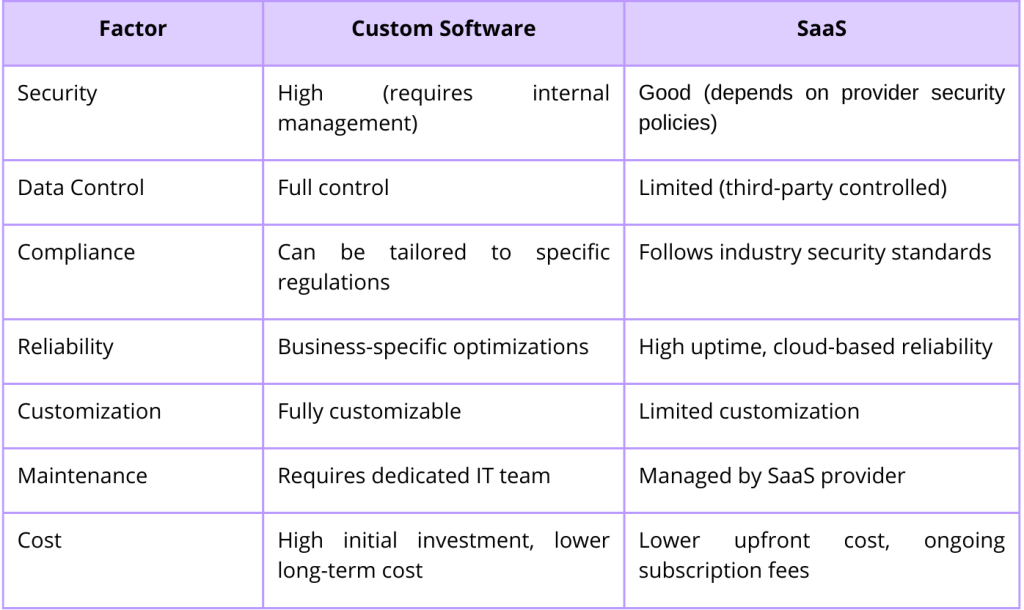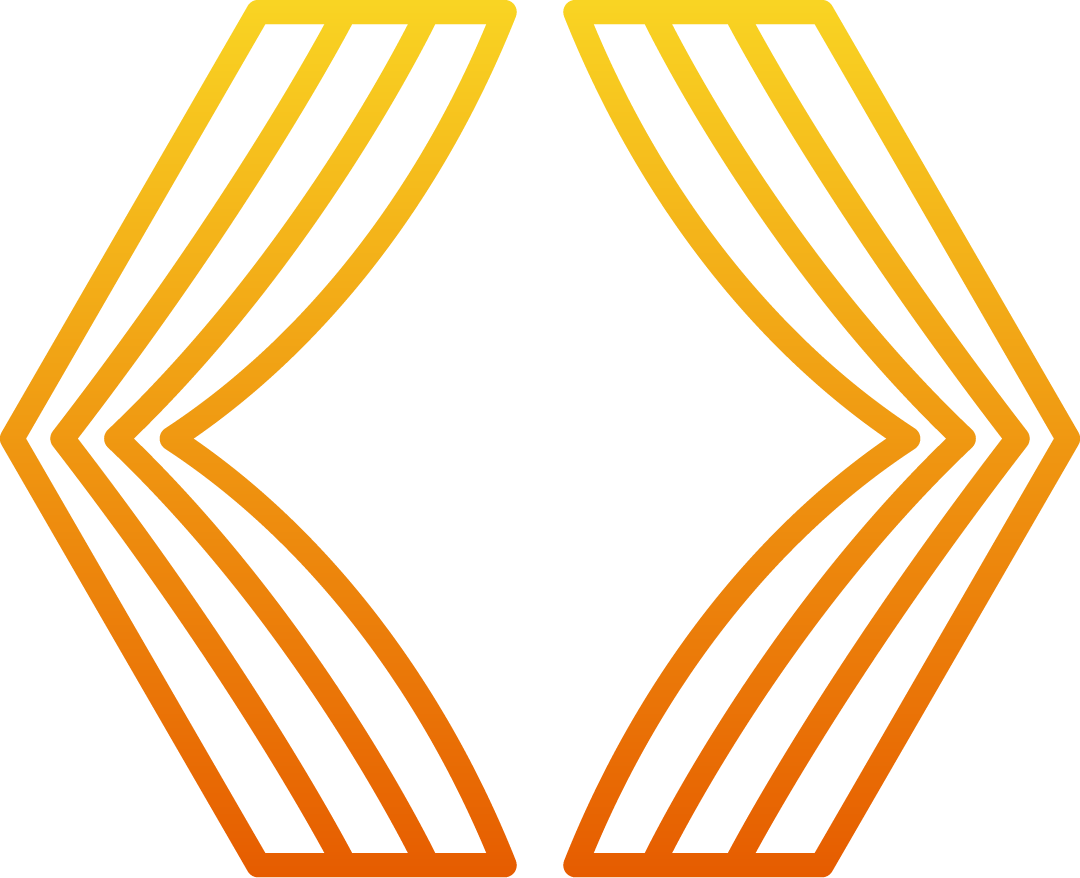
22 Mar Custom Software vs. SaaS: Which One is More Secure and Reliable?
Security and reliability are critical factors when choosing between custom software and Software as a Service (SaaS) solutions. Businesses need to assess which option best aligns with their operational needs, security requirements, and long-term goals.
Custom software provides tailored security and full control over infrastructure, while SaaS offers convenience, scalability, and built-in security measures. This article explores the security and reliability aspects of both solutions to help businesses make an informed decision.
Understanding Custom Software and SaaS
Before comparing security and reliability, it is important to define both options:
Custom Software: A fully tailored application developed specifically for a business’s unique needs. It can be built in-house or by a software development partner and is hosted on a dedicated infrastructure.
SaaS (Software as a Service): A cloud-based solution provided by third-party vendors, offering ready-to-use software through a subscription model. Examples include Google Workspace, Salesforce, and Microsoft 365.
Both solutions have distinct advantages and security considerations, which will be explored in detail.
Security Considerations
Custom Software: More Control, Higher Responsibility
Custom software allows businesses to implement security measures tailored to their specific needs. Some advantages include:
- Full Data Control – Companies decide how and where their data is stored, reducing exposure to third-party risks.
- Custom Security Protocols – Businesses can integrate advanced security measures, such as multi-layer encryption, access control policies, and security audits.
- Less Exposure to Mass Attacks – Unlike SaaS, which serves multiple users, custom software is not a high-profile target for cybercriminals.
However, custom software also comes with challenges:
- Requires Ongoing Security Maintenance – Businesses must handle software updates, security patches, and vulnerability testing.
- Higher Development Costs – Implementing robust security features can be expensive and time-consuming.
SaaS: Built-in Security, but Shared Responsibility
SaaS providers offer pre-configured security features, reducing the burden on businesses. Some benefits include:
- Automatic Security Updates – SaaS providers handle patches and software updates, ensuring the latest security fixes.
- Enterprise-Grade Security – Leading SaaS providers comply with industry security standards such as ISO 27001, SOC 2, GDPR, and HIPAA.
- Disaster Recovery and Data Backups – Cloud-based solutions automatically back up data, reducing the risk of loss.
However, SaaS has some security concerns:
- Limited Control Over Data – Businesses rely on third-party vendors for data security, making compliance and privacy concerns more complex.
- Higher Risk of Data Breaches – Since multiple companies use the same SaaS infrastructure, security breaches can expose customer data across multiple businesses.
- Potential Vendor Lock-in – Companies depend on the vendor’s security policies and infrastructure, limiting flexibility.
Reliability and Performance Comparison
Custom Software: Optimized for Business Needs
Custom software is designed for specific business requirements, ensuring better performance and tailored optimizations.
- Optimized Performance – Built to handle business-specific workloads efficiently.
- Scalability Options – Businesses can expand their infrastructure based on growth needs.
- Dedicated Support – Companies have full control over maintenance, updates, and troubleshooting.
However, there are challenges:
- Requires Dedicated IT Team – Maintaining performance requires internal resources.
- Downtime Risks – Without proper infrastructure planning, reliability issues can arise.
SaaS: High Availability, but Less Control
SaaS solutions provide reliable cloud infrastructure, ensuring high uptime and performance.
- 99.9 Percent Uptime Guarantees – Most providers offer Service Level Agreements (SLAs) with guaranteed uptime.
- Global Accessibility – SaaS applications run on cloud data centers, providing fast access worldwide.
- Automatic Performance Optimization – SaaS vendors continuously optimize resources for better efficiency.
However, there are potential downsides:
- Limited Customization – Businesses may experience performance limitations due to standardized configurations.
- Service Disruptions – If a vendor experiences downtime (e.g., AWS outages), businesses lose access to critical applications.
- Latency Issues – Cloud-based applications may experience lag due to internet dependency.
Which One Should You Choose?

How PT. KDN Can Help
Whether your business needs custom software development or SaaS integration, PT. KDN offers secure, scalable, and performance-driven solutions.
For custom software solutions, PT. KDN provides:
- End-to-end security implementation to protect business-critical applications.
- Compliance-focused development to meet industry regulations.
- Ongoing maintenance and performance optimizations to ensure long-term reliability.
For businesses looking for SaaS implementation, PT. KDN offers:
- Seamless integration of SaaS platforms into existing business processes.
- Security audits and compliance checks to ensure data protection.
- Optimization strategies to enhance software performance and minimize costs.
By partnering with PT. KDN, businesses can ensure their software solutions remain secure, reliable, and scalable for future growth.
Conclusion
Selecting between custom software and SaaS depends on your business’s security, compliance, and operational needs.
- Custom software is ideal for companies needing full control, enhanced security, and tailored performance but requires higher initial costs and ongoing maintenance.
- SaaS solutions provide convenience, scalability, and automatic updates but come with limited customization and third-party data control.


Sorry, the comment form is closed at this time.